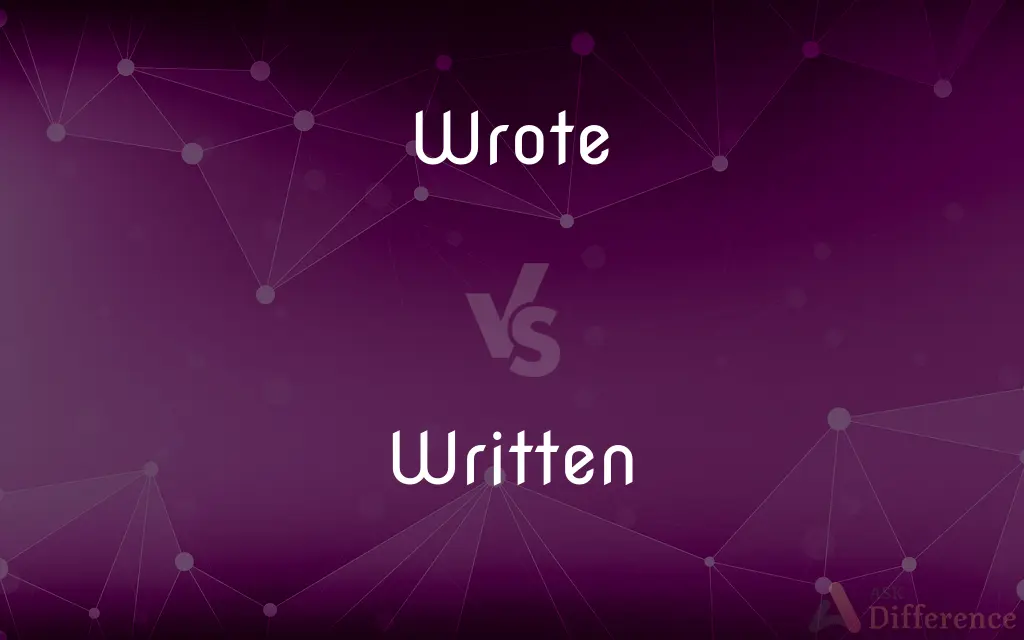Wrote vs. Written — What's the Difference?
By Fiza Rafique & Maham Liaqat — Updated on April 25, 2024
"Wrote" is the simple past tense of "write," used for actions completed in the past, while "written" is the past participle, used with auxiliary verbs.

Difference Between Wrote and Written
Table of Contents
ADVERTISEMENT
Key Differences
"Wrote" is used to describe an action that someone completed in the past. For example, one might say, "She wrote a letter yesterday." On the other hand, "written" is typically used to indicate a completed action in various perfect tenses, such as "She has written a novel."
"Wrote" directly follows the subject in simple past constructions, not requiring any auxiliary verbs. Whereas "written" must always be accompanied by an auxiliary verb like "has," "had," or "have."
The use of "wrote" implies a straightforward, finite action confined to a specific time in the past. In contrast, "written" often connects past actions to the present, as in the present perfect tense, or discusses conditions, such as in passive voice constructions like "The book was written by her."
The choice between these forms affects the temporal and aspectual relationship conveyed about the action, with "wrote" focusing on the action's occurrence and "written" on the action’s relevance or completion.
Comparison Chart
Tense
Simple past
Past participle
ADVERTISEMENT
Usage
Used without auxiliary verbs.
Used with auxiliary verbs ("has," "have," "had," etc.).
Example Context
Describing completed actions confined to a specific past time.
Indicating actions relevant to the present or unspecified time.
Formation
Subject + wrote + object (e.g., She wrote a letter.)
Subject + has/have/had + written + object (e.g., She has written a letter.)
Narrative Function
Highlights the completion of an action in the past.
Connects an action to present circumstances or states completion.
Compare with Definitions
Wrote
Past tense of write, indicating past action without continuation.
She wrote the report last night.
Written
Past participle of write, used in perfect tenses.
The novel has been written and published.
Wrote
Used to specify when an action was completed in the past.
He wrote his first poem when he was eight.
Written
Often used to express an action affecting the present.
The rules have been written clearly.
Wrote
Denotes a single, completed action.
I wrote a note to remind myself.
Written
Requires an auxiliary verb for grammatical completeness.
This poem had been written before the event.
Wrote
Implies action confined to a particular past moment.
We wrote our thoughts down during the meeting.
Written
Used in passive voice constructions.
The letter was written by John.
Wrote
Directly follows the subject in simple past sentences.
They wrote their essays independently.
Written
Indicates a condition or state resulting from a past action.
A manuscript was written but never published.
Wrote
Past tense of write.
Written
Past participle of write.
Wrote
Past participle of write
Written
Of, relating, or characteristic of writing (i.e., of that which has been written).
Wrote
To root with the snout. See 1st Root.
Written
Having been written.
I can speak Japanese fairly well, but I have no understanding whatsoever of written Japanese.
Written
Inflection of write
Has your girlfriend written you a letter yet?
Written
Set down in writing in any of various ways;
Written evidence
Written
Systematically collected and written down;
Written laws
Written
Written as for a film or play or broadcast
Common Curiosities
Why is "written" often found in passive sentences?
"Written" works well in passive constructions to focus on the action's object rather than its subject.
How does the use of "wrote" affect the narrative of a sentence?
Using "wrote" clarifies that an action was completed at a definite time in the past, emphasizing the action's finality.
What is the main grammatical difference between "wrote" and "written"?
"Wrote" is the simple past tense, while "written" is the past participle and requires an auxiliary verb.
What type of auxiliary verbs is "written" associated with?
"Written" is used with "has," "have," "had," "was," and "were."
What is an example of "wrote" in a simple past sentence?
Example: "He wrote the book in one month."
Can "wrote" and "written" be used interchangeably?
No, they serve different grammatical purposes and are not interchangeable.
Is "wrote" ever used with an auxiliary verb?
No, "wrote" stands alone as the simple past tense without needing auxiliary verbs.
How do "wrote" and "written" function in legal or formal documents?
In legal or formal contexts, "written" is often used to discuss documents whose contents remain relevant or in force.
In what scenarios is "written" preferred over "wrote"?
"Written" is preferred when discussing the current relevance of a past action or in compound tenses.
What does the use of "written" in a perfect tense suggest about the subject's experience?
It suggests that the subject's experience is complete but continues to be relevant or influential.
How can "written" be used in a present perfect sentence?
Example: "She has written three books this year."
How do "wrote" and "written" differ in passive constructions?
"Wrote" cannot be used in passive constructions, whereas "written" is commonly used in such scenarios.
What is a practical example using both "wrote" and "written"?
Practical Example: "She wrote the first draft; it has since been written and rewritten several times."
What does the use of "written" imply about the timeframe of an action?
"Written" implies that the action has implications beyond its immediate completion, often stretching to the present.
Can "wrote" be used to describe an ongoing or habitual action?
No, "wrote" specifically indicates a completed action with no continuation.
Share Your Discovery

Previous Comparison
Check vs. Cheque
Next Comparison
Association vs. ClubAuthor Spotlight
Written by
Fiza RafiqueFiza Rafique is a skilled content writer at AskDifference.com, where she meticulously refines and enhances written pieces. Drawing from her vast editorial expertise, Fiza ensures clarity, accuracy, and precision in every article. Passionate about language, she continually seeks to elevate the quality of content for readers worldwide.
Co-written by
Maham Liaqat












































